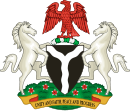Igue festival: Difference between revisions
Added citation Tags: Visual edit Mobile edit Mobile web edit |
m →External links: recat |
||
| (18 intermediate revisions by 9 users not shown) | |||
| Line 1: | Line 1: | ||
{{Short description|Festival in Nigeria by the Binis}} |
|||
| ⚫ | '''Igue festival''' (also known as ''' |
||
| ⚫ | |||
| ⚫ | '''Igue festival''' (also known as ''' King's Festival''') is a celebration with its origin in the [[Benin Kingdom]] of [[Edo State]], southern [[Nigeria]].<ref name="Ryder1981">{{cite book|last=Ryder|first=A.F.C.|title=General History of Africa: Africa from the Twelfth to the Sixteenth Century|year=1981|publisher=UNESCO|location=Paris|pages=339–370|editor=D.T. Niane}}</ref> One tradition states that the festival date coincided with the marriage of [[Ewuare]] to a wife named Ewere.<ref name="Egharevba1960">{{cite book|last=Egharevba|first=Jacob|title=A Short History of Benin|year=1960|publisher=Ibadan University Press|location=Ibadan}}</ref> Celebrated between Christmas and New Year, the festival includes the Oba's blessing of the land and his people. During the Igue ritual season, the Oba is prohibited from being in the presence of any non-native person.<ref name=":0">{{Cite web|title=Igue Festival: A unique Benin celebration|url=https://dailytrust.com/igue-festival-a-unique-benin-celebration|access-date=2021-08-30|website=Daily Trust|date=17 March 2019 |language=en}}</ref> |
||
== History == |
== History == |
||
The Igue Festival was initiated in the 14th century during the reign of Oba Ewuare I, who reigned in Benin between year 1440 and 1473.<ref>{{Cite web |title=Vanguard News |url=https://www.vanguardngr.com/ |access-date=2023-01-25 |website=Vanguard News |language=en-GB}}</ref> Following Oba Ewuare I's experience whilst fighting as a prince for the Benin throne, he was known as the Prince Ogun, the son of Oba Ohen as at then.<ref name=":1">{{Cite web|date=2018-01-28|title=There' nothing fetish about Igue Festival — Chief David Edebiri|url=https://guardian.ng/sunday-magazine/there-nothing-fetish-about-igue-festival-chief-david-edebiri/|access-date=2021-08-31|website=The Guardian Nigeria News - Nigeria and World News|language=en-US}}</ref> |
The Igue Festival was initiated in the 14th century during the reign of Oba Ewuare I, who reigned in Benin between year 1440 and 1473.<ref>{{Cite web |title=Vanguard News |url=https://www.vanguardngr.com/ |access-date=2023-01-25 |website=Vanguard News |language=en-GB}}</ref> Following [[Ewuare|Oba Ewuare]] I's experience whilst fighting as a prince for the Benin throne, he was known as the Prince Ogun, the son of Oba Ohen as at then.<ref name=":1">{{Cite web|date=2018-01-28|title=There' nothing fetish about Igue Festival — Chief David Edebiri|url=https://guardian.ng/sunday-magazine/there-nothing-fetish-about-igue-festival-chief-david-edebiri/|access-date=2021-08-31|website=The Guardian Nigeria News - Nigeria and World News|language=en-US}}</ref> |
||
The Igue festival however now consists of several other festivals put together by the Oba Akenzua II. This is because he wanted the festival to last for couple of days due to the current movement of people and the Igue festival has become a terminal for many other festivals celebrated by the Benin people.<ref name=":1" /><ref name=":2">{{Cite journal|last1=Osahue|first1=Stevenson|last2=Omoera|date=2008-12-01 |
The Igue festival however now consists of several other festivals put together by the [[Akenzua II|Oba Akenzua II.]] This is because he wanted the festival to last for couple of days due to the current movement of people and the Igue festival has become a terminal for many other festivals celebrated by the Benin people.<ref name=":1" /><ref name=":2">{{Cite journal|last1=Osahue|first1=Stevenson|last2=Omoera|date=2008-12-01|title=Igue Ceremony as a Theatrical Performance: An Appraisal|url=https://www.researchgate.net/publication/215711068|department=Department of Theatre and Media Arts, Ambrose Alli University, Ekpoma, Edo State, Nigeria|journal=Kamla-Raj 2008|language=en|volume=Studies of Tribes and Tribals 6(2)|issue=2|pages=111–115|doi=10.1080/0972639X.2008.11886584|s2cid=194787661}}</ref> |
||
==References== |
==References== |
||
| Line 12: | Line 15: | ||
* [https://oldnaija.wordpress.com/2015/07/19/igue-festival/ The Igue Festival - Edo’s colourful festival] |
* [https://oldnaija.wordpress.com/2015/07/19/igue-festival/ The Igue Festival - Edo’s colourful festival] |
||
{{Edo State}} |
|||
| ⚫ | |||
| ⚫ | |||
<br /> |
|||
[[Category:Festivals in Nigeria]] |
[[Category:Festivals in Nigeria]] |
||
[[Category:Edo State]] |
[[Category:Edo State]] |
||
[[Category:Cultural festivals in Nigeria]] |
[[Category:Cultural festivals in Nigeria]] |
||
{{Nigeria-stub}} |
|||
| ⚫ | |||
Latest revision as of 22:52, 2 April 2024
| This article is part of a series in |
| Culture of Nigeria |
|---|
 |
Igue festival (also known as King's Festival) is a celebration with its origin in the Benin Kingdom of Edo State, southern Nigeria.[1] One tradition states that the festival date coincided with the marriage of Ewuare to a wife named Ewere.[2] Celebrated between Christmas and New Year, the festival includes the Oba's blessing of the land and his people. During the Igue ritual season, the Oba is prohibited from being in the presence of any non-native person.[3]
History
[edit]The Igue Festival was initiated in the 14th century during the reign of Oba Ewuare I, who reigned in Benin between year 1440 and 1473.[4] Following Oba Ewuare I's experience whilst fighting as a prince for the Benin throne, he was known as the Prince Ogun, the son of Oba Ohen as at then.[5]
The Igue festival however now consists of several other festivals put together by the Oba Akenzua II. This is because he wanted the festival to last for couple of days due to the current movement of people and the Igue festival has become a terminal for many other festivals celebrated by the Benin people.[5][6]
References
[edit]- ^ Ryder, A.F.C. (1981). D.T. Niane (ed.). General History of Africa: Africa from the Twelfth to the Sixteenth Century. Paris: UNESCO. pp. 339–370.
- ^ Egharevba, Jacob (1960). A Short History of Benin. Ibadan: Ibadan University Press.
- ^ "Igue Festival: A unique Benin celebration". Daily Trust. 17 March 2019. Retrieved 2021-08-30.
- ^ "Vanguard News". Vanguard News. Retrieved 2023-01-25.
- ^ a b "There' nothing fetish about Igue Festival — Chief David Edebiri". The Guardian Nigeria News - Nigeria and World News. 2018-01-28. Retrieved 2021-08-31.
- ^ Osahue, Stevenson; Omoera (2008-12-01). "Igue Ceremony as a Theatrical Performance: An Appraisal". Department of Theatre and Media Arts, Ambrose Alli University, Ekpoma, Edo State, Nigeria. Kamla-Raj 2008. Studies of Tribes and Tribals 6(2) (2): 111–115. doi:10.1080/0972639X.2008.11886584. S2CID 194787661.
External links
[edit]

